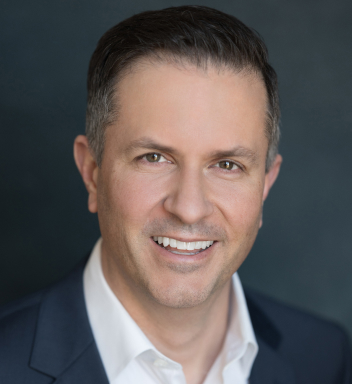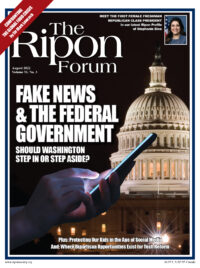
When it comes to speech, the internet is more like a grocery store than like Main Street—and it’s in our collective interest to keep it that way.
No one has a constitutional right to march up and down Harris Teeter’s produce aisle yelling racial slurs or harassing customers, just as no one has a constitutional right to be on Twitter doing the same thing. Why? The First Amendment protects us from the government impinging on our speech rights, but it doesn’t give us the right to say anything, anywhere we want.
America has a robust free speech tradition that we should celebrate. Crucially, it’s a speech tradition that stops short of limiting others’ speech in private spaces. While the government cannot limit your speech rights (beyond limiting illegal speech), plenty of private services and organizations can and do. Apartment buildings have as much a right to post a “no soliciting” sign as online platforms do to enforce strict policies against misinformation, spam, or calls for violence.
While the government cannot limit your speech rights (beyond limiting illegal speech), plenty of private services and organizations can and do.
This tradition has been upheld time and time again by the courts. For example, in a majority opinion from 2018, Justice Kavanaugh wrote “when a private entity provides a forum for speech, the private entity is not ordinarily constrained by the First Amendment because the private entity is not a state actor. The private entity may thus exercise editorial discretion over the speech and speakers in the forum.”
As this opinion (and, notably, the minority opinion in the same case) makes clear, attempts to regulate the speech of private individuals acting in private run squarely up against the Constitution. Indeed, two recent attempts to regulate speech in this way from Florida and Texas failed spectacularly.
When someone—whether a former president or an average citizen—claims their or another individual’s “First Amendment” rights to speech on any online platform are being limited, they’re mistaking their right to say something with their right to say it on someone else’s platform.
Often, they’re decrying the removal of “lawful, but awful” speech—misinformation, spam, and threats that fall short of a crime. And this is exactly the kind of speech that most people want platforms to moderate. Imagine a world where Alex Jones has a right to post his false claims that the Sandy Hook shooting never happened and to harass grieving parents on Instagram. Or imagine if Arizona Rep. Paul Gosar was able to falsely accuse a trans woman of being a school shooter on Twitter with impunity.
While this speech may be constitutional, it’s despicable. No service should be obligated to carry it.
It’s not as if there aren’t spaces that would be happy to carry Jones or Gosar’s vitriol. A host of platforms have cropped up in recent years that boast lax content moderation standards, including social media sites and message boards, not to mention offline options.
In the U.S., we’re afforded freedom of speech, but not freedom of reach. No one is guaranteed a megaphone.
Constitutionality aside, it’s also important to note that a “must-carry” requirement would create a fundamentally worse experience online for everyone and a terrible coarsening of our national discourse. The First Amendment is simply a poor standard for what should or shouldn’t be allowed on any given service. In many cases, hate speech, misinformation, and spam are all legal speech.
Our country and our national conversation would be unequivocally worse if shop owners couldn’t eject a customer for spouting racism or QAnon conspiracy theories. The same should hold true for online platforms.
In the U.S., we’re afforded freedom of speech, but not freedom of reach. No one is guaranteed a megaphone. And that holds especially true in private places. Fundamentally reversing the tenets of the First Amendment exclusively for online speech would flood the national conversation with hate, conspiracy, and spam.
Adam Kovacevich is the Founder and CEO of Chamber of Progress.




